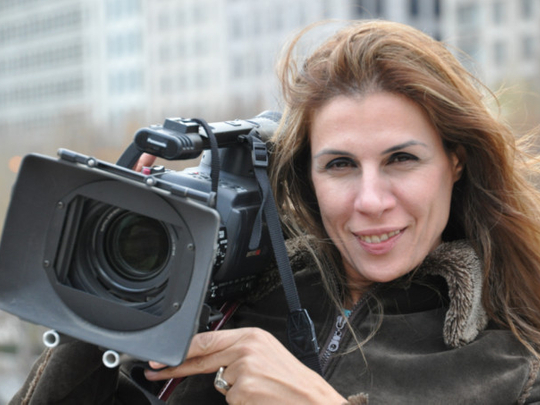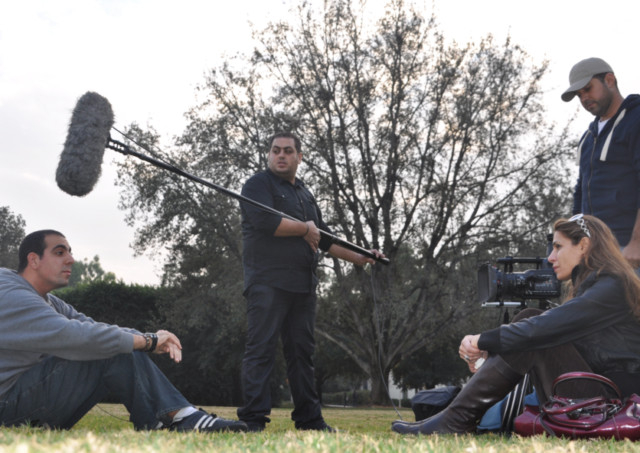
It is Oscar season in Hollywood and the spotlight is focused on the films lined up for the 85th academy awards ceremony.
“5 Broken Cameras”, a Palestinian/Israeli/French production, is a nominee in the documentary category. It tells the story of a Palestinian village’s non-violent struggle against Israel’s separation wall, colony construction and military control, as told through the eyes (and lens) of Emmad Burnat, a resident of Bil’in, which has become a model and international symbol of Palestinian civil disobedience.
Many in Palestine, however, believe that the involvement of an Israeli in the production has led to the documentary’s nomination. Palestinians have been making documentaries inspired by the occupation for some time — why only now has one of their productions taken centre stage? they ask.
Sawsan Qaoud, a filmmaker and lecturer at Al Quds University, thinks otherwise: “I feel proud that a Palestinian documentary has made it,” she says. “I did not see it, but we all make films to make a difference. To me, all that matters is that the message will make people talk about it”.
She points out that only recently a young Palestinian filmmaker, Khalid Jarrar, won the annual prize of the International Critics For Arab films (from the International Federation of Film Critics [FIPRESCI] in Dubai, the world’s foremost body of film writers, academics and critics from more than 60 countries) for the best documentary with “Mutasalilun” (Infiltrators), which documents Palestinian workers who sneak into Israel to earn a living and support their families.
Palestinian films have also been receiving attention outside of the Oscars. “May in Summer”, written and directed by Cherien Dabis, which featured in this year’s Sundance Film Festival, tells the story of a Jordanian woman living in America who undergoes an identity crisis when she returns to her family in Jordan to plan her marriage.
Qaoud pays tribute to her generation of Palestinian documentary filmmakers who began plying their trade in the Nineties. “We have many excellent filmmakers who have done sterling work and continue to do so, “ she says. “Initially all our documentaries were political, but we have moved on to human interest and arty films. Politics is not the main issue for me. I focus on human stories, which tell who Palestinians are. My focus is women, as I feel for a mother and a child, and I have access to the community. Most of all, I am able to go into details and delve deep into the story. On the other hand, we can’t escape from the political situation we are living in, which surfaces in all our stories.”
Qaoud studied for her masters in television journalism in Moscow, before going on to study filmmaking in London. After working for MBC Television in London as a reporter, she returned home to set up her own filmmaking company in Ramallah. Today, she also works as a lecturer mentoring young Palestinians in her craft.
Her first documentary film of note was based on an aspect of life of the Samaritan community, the world’s smallest minority that lives on Mount Gerizim, adjoining the ancient Palestinian city of Nablus. As she herself was born and raised in Nablus, her interest in her neighbours was nurtured while growing up. She spent two years filming Samaritan women in arranged marriages, and followed her main character, a pregnant woman, until the delivery, especially documenting their unique traditions around the birth of the child. This project, which was funded by National Geographic, Al Jazeera and the Goteborg Film Festival, propelled her to the ranks of talented Palestinian documentary filmmakers.
On the heels of this success, Qaoud filmed “Women in the Stadium”, an hourlong documentary on the Palestinian national women soccer team.
“Many women watch soccer here and they love either Real Madrid or Barcelona, but when I learnt that we have a national soccer team that is very good, I decided to do a documentary and thus my journey began,” she recalls. “I followed the characters from Ramallah and Bethlehem for almost a year and noted how they fought checkpoints, separation and other hardships to meet and play soccer. Eventually the film climaxes with an international game in Jordan.”
She has an emotional attachment with this film. “I shared the feeling of losing or winning with women, whom men generally perceive as wearing shorts and being tough,” she says. “In real life, they have a feminine side and through them and their story, I believe our message was delivered.”
This documentary has featured in many international festivals, and it was also shown on Al Jazeera. “Viewers loved the film — it was so different, with one woman even wearing the hijab and playing soccer,” Qaoud says.
She then made “Composing History”, a film on the life and times of an 80-year-old Palestinian woman, Reem Naser Tarazi — a musician, a pianist and Palestine’s first woman composer who also established the Edward Said National Conservatory of Music in Ramallah.
“Her story is interesting, she is 80 years old and still full of life,” Qaoud says. “The documentary captures her memories which are a reflection of the politics expressed through the medium of music. It premiered in Ramallah on her birthday. She still teaches music to a new generation and tells them about the land, the political situation and the soul of the Palestinian embedded in our roots. It is a story about music through politics.”
Qaoud’s most recent work, titled “Prison outside the Bars”, was completed a year after she began filming in 2011 and it coincided with the exchange of hundreds of Palestinian prisoners for the lone Israeli soldier, Gilad Shalit, captured by the Hamas in Gaza.
This film will be featuring in various International Film Festivals this year.
“I cried when I read about a Ukrainian woman, Irena, married to a Palestinian, Ebrahim, both in prison. One of their daughters, Yasmeen, was back in her homeland and another daughter, Gazzala, in Aldeheesha Refugee Camp, near Bethlehem, both growing up separately while their parents are incarcerated in separate prisons in Israel. The mother was initially given a three-year sentence and after two years, a parole board requested that she return to Ukraine. Her refusal to do so led to a new 20-year sentence.
“When I learnt that Irena was getting out of prison, I arranged with the Palestinian Embassy in Ukraine for her mum’s and daughter’s presence in Ramallah. I filmed the mum and granddaughter embarking on the journey from Ukraine, landing at the airport, and I personally took them to Aldeheesha Refugee Camp to capture the reunion.”
It was an emotional moment that Qaoud captured on celluloid, one that speaks volumes about the suffering the Israeli occupation has wrought on the Palestinians.
When asked about Irena’s crime, Qaoud explains, “During the Second Intifada, Ebrahim drove two suicide bombers to Tel Aviv and she accompanied him. Irena insists that she did not know about the two passengers, but the Israelis still imprisoned both of them.
“While in prison, Irena befriended Muslim inmates and became very religious. She now wears the hijab. I tried to obtain prison footage but had no access.”
The film points out that her daughters speak two different languages and don’t know each another —“a human prison outside the bars”, as Qaoud puts it.
It also tells the story of Ahlam Tamimi who got engaged in prison and who, on her release, was forced by the Israelis into exile in Jordan, while her fiancé had to remain in Palestine.
“In the first story, the mother is faced with a dilemma and has to choose whether to remain in Palestine or to go back to Ukraine, whereas in the case of Ahlam, her fiancé eventually joins her there.”
The film was shot in Ukraine, Palestine and Jordan and has already been shown on Al Jazeera.
Qaoud, who could easily be on the other side of the camera, is now shooting material for a documentary on the diasporic Palestinians and has only recently returned from the United States.
Why filmmaking and why Palestine? “Unlike some of my siblings who have been imprisoned by the Israelis, I have never been politically active,” she says. “I call myself a political artiste and this is what I can do for Palestine, with screenings in Europe and elsewhere. This is why I am here! I can’t live elsewhere!”
Now “5 Broken Cameras” seems to have turned the spotlight back on Palestinian documentary films and it may just be the impetus people such as Qaoud need in their quest for a larger audience and recognition.
Rafique Gangat, author of Ye Shall Bowl on Grass, is based in Occupied Jerusalem.



